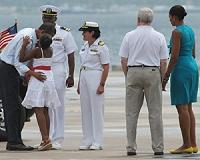| . |  |
. |
Washington (AFP) Aug 16, 2010 Louisiana's first shrimping season since the BP oil disaster spewed millions of gallons of crude into the Gulf of Mexico got underway Monday, but few boats took to the water and the ones that did found oil, a major shrimp wholesaler said. "We got four boats that went out -- out of 1,400 -- and I'm hearing they're finding oil," Dean Blanchard, the largest shrimp wholesaler in the United States told AFP by phone from Grand Isle, Louisiana. "They drag, they find oil, they throw the stuff back in, and they're looking for cleaner waters," he said. The Louisiana commission of wildlife and fisheries announced that the August shrimp season would open on schedule Monday after several government agencies gave most of the state's fishing grounds a clean bill of health, Ewell Smith, executive director of the Louisiana Seafood Promotion Board said. "NOAA, FDA, EPA -- all those groups have given us a clean bill of health as far as the waters that are open," said Smith, referring to the National Oceanic and Atmospheric Administration, the Food and Drug Administration and the Environmental Protection Agency. "Nearly all state waters are open -- we're close to 90 percent open including part of Barataria Bay," a key shrimping ground, Smith added. Blanchard said he had heard reports that only around 50 boats out of Louisiana's fleet of around 5,000 had taken to sea for the start of the four-month shrimping season, but it was impossible to confirm the number. Many Louisiana fishermen were still working on the clean-up effort, for which they get paid by BP, whose rig sparked the worst environmental disaster in US history when it blew up in April and sank to the sea floor, hemorrhaging crude for more than 100 days. The well was capped early this month, but scientists have warned that the effects of the oil that gushed from it and the dispersant used to break up the slick could contaminate Gulf seafood for years. "Oil can release hydrogen sulfide gas and contains traces of heavy metals as well as nonvolatile polycyclic aromatic hydrocarbons that can contaminate the food chain," Drs Sarah Janssen and Gina Solomon wrote in the Journal of the American Medical Association (JAMA). Polycyclic aromatic hydrocarbons include "probable carcinogens" and can accumulate for years in invertebrates such as oysters, crab and shrimp, the signature seafood of the Gulf of Mexico, they warned. Nearly three-quarters of US wild shrimp come from the Gulf of Mexico, which is also a major US crab fishery and oyster ground.
Share This Article With Planet Earth
Related Links Water News - Science, Technology and Politics
 Obama, daughter swim in Gulf in act of reassurance
Obama, daughter swim in Gulf in act of reassurancePanama City, Florida (AFP) Aug 15, 2010 US President Barack Obama and his daughter have taken a dip in the Gulf of Mexico in an attempt to reassure Americans that, despite a massive oil spill, its waters remain safe for tourists. The president, First Lady Michelle Obama, and their younger daughter, Sasha, traveled to this Florida panhandle city to talk to local officials and business leaders, and highlight the region's tourist att ... read more |
|
| The content herein, unless otherwise known to be public domain, are Copyright 1995-2010 - SpaceDaily. AFP and UPI Wire Stories are copyright Agence France-Presse and United Press International. ESA Portal Reports are copyright European Space Agency. All NASA sourced material is public domain. Additional copyrights may apply in whole or part to other bona fide parties. Advertising does not imply endorsement,agreement or approval of any opinions, statements or information provided by SpaceDaily on any Web page published or hosted by SpaceDaily. Privacy Statement |